role of industrial revolution in organisation behaviour
•Download as PPT, PDF•
4 likes•7,607 views
The Industrial Revolution was a period from the 18th to 19th century where major changes in agriculture, transportation, and technology had a profound socioeconomic and cultural impact on Britain. These changes then spread throughout Europe, North America, and eventually the world. In Britain, businesses were free to adopt new inventions and methods of production, such as the steam engine in 1705 and the spinning thread machine in 1741. This led to the evolution of factories and the need for managing large workforces and raw materials, establishing the concept of management. Key figures like Adam Smith, Robert Owens, F.W. Taylor, and J.N. Tata contributed to the continuing evolution of organizational behavior over time.
1 of 8
Downloaded 50 times

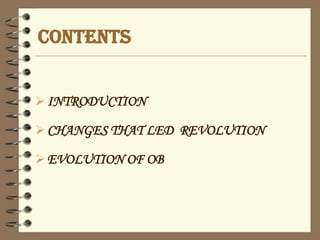
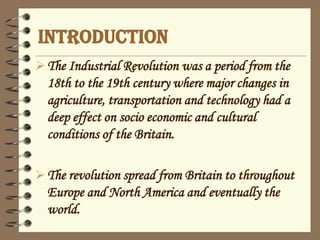
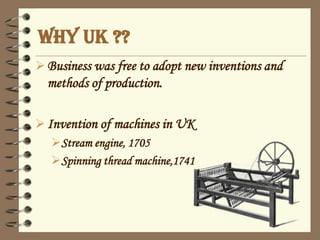
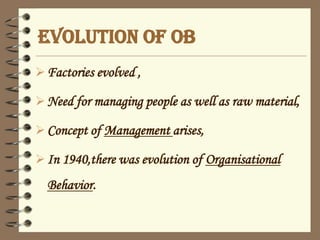
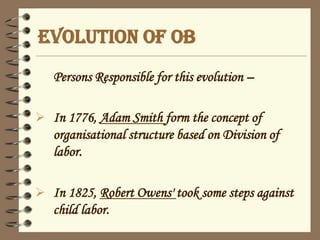
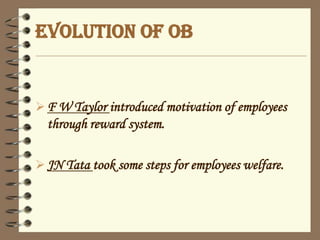

Recommended
Introduction to Human Resource Management Evolution, Objective, Nature, Philo...



Introduction to Human Resource Management Evolution, Objective, Nature, Philo...Rai University Ahmedabad Human resource management has evolved over three periods: (1) before the industrial revolution when apprentices assisted craftspeople, (2) during the industrial revolution when personnel management emerged to handle worker wages and unions, and (3) after the industrial revolution when scientific management and studies like Hawthorne shifted the focus to worker satisfaction and treating employees as a valuable resource. Modern HRM aims to maximize employee performance for business objectives through policies and development activities like recruitment, benefits, training, and performance reviews.
Evolution of organisation behaviour



Evolution of organisation behaviourUjjwal 'Shanu' This document provides an overview of organisational behaviour. It discusses how OB seeks to understand individual, group, and organisational behaviour using scientific methods. Key topics covered include early management theories from Adam Smith to Frederick Taylor's scientific management. It also summarizes research from the Hawthorne studies and classical organisation theorists like Fayol, Weber, and Barnard. The document traces the development of OB from its classical roots to modern behavioural and contingency perspectives, noting changing challenges with globalization, diversity, and new forms of work and organization.
industrial revolution|organisational behaviour

industrial revolution|organisational behaviourANITACHOUDHARI3 The Industrial Revolution began in the 18th century in England and spread across the world. It transformed economies from agrarian and handicraft to machine manufacturing and industry. Notable inventions like improved transportation and communication led to changes. Managers were needed to coordinate large factories. Early thinkers like Robert Owen, Andrew Ure, and J.N. Tata emphasized treating workers humanely by banning child labor, providing benefits, and improving safety. However, their ideas were not widely accepted at the time and management of people was not fully recognized as important.
Ob ppt on motivation 

Ob ppt on motivation bilal khan This document discusses motivation and its importance for both individuals and businesses. Motivation is defined as the drive that pushes one to work hard and achieve goals even when facing difficulties. For individuals, motivation helps achieve personal goals and increases job satisfaction. For businesses, a motivated workforce improves teamwork, productivity, and ability to adapt to changes. The document then examines various theories of motivation, including Maslow's hierarchy of needs and Herzberg's two-factor theory, and discusses how rewards, leadership, empowerment, and trust can boost employee motivation.
Evolution of Organizational Behavior

Evolution of Organizational BehaviorHafiz JUNAID The document discusses the evolution of management theories from ancient times to the present. It describes early ideas on management, strategy, and leadership from thinkers like Sun Tzu and Machiavelli. It then covers the Classical, Behavioral, Quantitative, and Contingency approaches to management. The Classical approach from 1890 emphasized organizational efficiency while the Behavioral approach from 1910 focused on human factors. The systems approach from the 1950s-1960s viewed organizations as open systems. Finally, the Contingency approach of the 1970s recognized that the best management approach depends on the situation or circumstances.
Management Gurus

Management GurusMarcus9000 The document profiles several influential management theorists and their key contributions:
1. Henri Fayol proposed the functions of management as planning, organizing, commanding, coordinating, and controlling.
2. Peter Drucker advocated for management by objectives (MBO) which focuses on results over processes through goal setting and performance reviews.
3. Michael Porter described three generic competitive strategies: cost leadership, differentiation, and focus.
4. The document examines additional theorists including Theodore Levitt, Abraham Maslow, Frederick Taylor, Elton Mayo, Douglas McGregor, and W. Edwards Deming.
Contribution of F.W Taylor (1) (1).ppt

Contribution of F.W Taylor (1) (1).pptssuser339828 This document discusses Frederick Winslow Taylor and his theory of scientific management. It provides an overview of Taylor's contributions and principles of scientific management, which included analyzing each job task, breaking work into components, setting productivity goals, and training workers. The document outlines both Taylor's views that management should be scientific and data-driven, as well as common criticisms that this approach dehumanizes workers. It concludes by noting that while scientific management was criticized for being reductionist, many of its tools and techniques to increase efficiency are still used in organizations today.
Job Analysis & Job Design

Job Analysis & Job DesignRebekahSamuel2 Job analysis is the systematic process of collecting information about jobs within an organization. It involves determining the tasks, duties, responsibilities, and skills required for each job. There are several methods for conducting job analysis, including interviews, questionnaires, observation, diaries/logs, and technical conferences. The key outcomes of job analysis are job descriptions, job specifications, and job evaluations. Job analysis provides important information for human resource functions like recruitment, selection, performance management, training, development, and compensation.
Classical approach of Management

Classical approach of ManagementAbhijith R The document provides an introduction to the classical approach to management. It discusses that the classical approach views employees as having only economic and physical needs. It was the oldest formal school of management originating in the early 1900s. The classical approach includes scientific management, administrative management, and bureaucratic management. Major contributors included Taylor, Fayol, and Weber. Taylor's scientific management focused on finding the most efficient way to perform jobs. Fayol analyzed management as a universal process and introduced 14 principles of management. Weber introduced concepts of bureaucratic organizations based on rational authority. The document also discusses management as both an art and a science.
Introduction of organizational behavior

Introduction of organizational behaviordeepu2000 1. Organizational behavior is the study of human behavior, attitudes, and performance within organizational settings, drawing on theories from disciplines like psychology, sociology, and anthropology.
2. It analyzes how the external environment affects organizations and their human resources, objectives, and strategies.
3. Organizational behavior is an interdisciplinary field that uses concepts from multiple reference disciplines like psychology, sociology, social psychology, anthropology, political science, management, and economics to understand, predict, and manage human behavior in organizations.
Herzberg two factor theory

Herzberg two factor theorywasim153 Frederick Herzberg proposed a two-factor theory of motivation in 1959, finding that certain job factors lead to satisfaction while separate factors prevent dissatisfaction. The theory is based on interviews with engineers and accountants about periods when they were happy or unhappy at work. Herzberg determined that motivational factors like achievement, recognition, and responsibility contribute to job satisfaction, while hygiene factors like company policies and pay only prevent dissatisfaction if absent. The two-factor theory suggests that satisfying higher-order needs through motivational job elements is important for motivation.
Trends in human resource management

Trends in human resource managementJoel Prakash 1.Globalization and its implications
2.Work-force Diversity
3.Changing skill requirements
4.Corporate downsizing
5.Continuous improvement programs
6.Re-engineering work processes for improved productivity
7. Contingent workforce
8.Decentralized work sites
9. Employee involvement
Job enrichment & Job enlargement 

Job enrichment & Job enlargement Apeksha tare The document discusses job enrichment and job enlargement. It defines job enrichment as making jobs more challenging by reducing repetitive tasks and giving employees more responsibilities and discretion. Job enlargement involves adding similar tasks horizontally to reduce boredom. The document outlines the advantages of each approach for employees and organizations, as well as potential disadvantages, and distinguishes between the two by comparing their focus, purpose, skill requirements and level of direction/control. It concludes that both can be effective tools for motivation but differ in focusing on vertical vs horizontal expansion.
Performance Appraisal in Tata Motors

Performance Appraisal in Tata Motorssurabhi agarwal The document provides information about performance appraisal at Tata Motors. It first discusses Tata Motors, including its history, operations, and products. It then discusses performance appraisal in general terms. Finally, it describes research conducted to evaluate Tata Motors' performance appraisal process, including findings, conclusions, and suggestions.
SOFT AND HARD HRM PRESENTATION

SOFT AND HARD HRM PRESENTATIONAnthonySadallaKhamis This presentation focuses on the Hard and Soft HRM. The Presenter also highlighted the Harvard, Michigan and Guest Theory of HRM. The presentation not only focuses on Hard and Soft HRM model, it also encompasses scopes of HRM.
Job design

Job designshonki009 A complete description of Job Design, its techniques, impact of technology on JD and the Socio-technical system approach.
hrp micro and macro level

hrp micro and macro levelDr.Aravind TS This document discusses human resource planning (HRP) at both the macro and micro levels. At the macro level, HRP focuses on aligning human resources with organizational strategy and examining policies that affect management. The micro level is driven by the macro level and develops tactics to help the organization achieve its goals by ensuring it has the right number and mix of employees. Key aspects of micro-level HRP include demand forecasting, manpower supply analysis, and manpower planning.
History of ob 

History of ob ahin_cecil This document summarizes the historical development of organizational behavior from several influential thinkers. It discusses early contributions from Plato, Aristotle, Confucius, and Machiavelli and their ideas around leadership, society, and authority. It then covers later thinkers like Adam Smith and the benefits of division of labor. Max Weber's theories of authority and rationality are outlined. The document also summarizes Frederick Taylor's scientific management principles and Elton Mayo's Hawthorne studies. Douglas McGregor's Theory X and Theory Y are contrasted. The concept of human capital and recent OB models are briefly mentioned at the end.
Survey feedback - comprehensive OD interventions - Organizational Change an...

Survey feedback - comprehensive OD interventions - Organizational Change an...manumelwin Collecting data about the system and feeding back the data for individuals and groups at all levels of the organization to analyze, interpret meanings, and design corrective action steps.
These are having two components- the use of Attitude Survey and the use of Feedback workshops.
Evolution of hrm

Evolution of hrmKULDEEP MATHUR The document discusses the evolution of human resource management (HRM) through 8 stages:
1) In the pre-industrial era, the Industrial Revolution led to the development of the factory system and a need for worker supervision but no formal HRM.
2) The emergence of modern corporations in the late 19th century resulted in the separation of employment from business ownership, requiring the modern practice of HRM.
3) In the early 20th century, scientific management theories and industrial psychology emerged to study worker productivity, leading to the establishment of personnel departments.
4) World War I further increased the need for systematic HRM practices to manage labor shortages and turnover. This marked the emergence of H
Evolution of production & operation management

Evolution of production & operation managementFaizan Ahmad The document summarizes the historical evolution of production and operation management from the 18th century to the present. It traces key developments such as Adam Smith's theories of specialization of labor in 1776, Frederick Taylor's scientific management principles from 1900, the development of operations research during World War 2, the introduction of computers and digital technology from the 1940s-1950s, and more recent incorporations of concepts like quality management, robotics, and CAD-CAM. The evolution has involved an increasing focus on integrating operations with overall business strategy and using analytical techniques and new technologies to improve productivity and quality over time.
Hr case study

Hr case studyanmolgarg12 Raghavan provided Sanjay, a new sales trainee, with sales reports and pamphlets about the company's products but did not provide any further training or guidance. This summary training method is insufficient for imparting the necessary job skills and instructions to Sanjay. A more suitable training method for Sanjay would be on-the-job training with direct supervision from an experienced manager to gain hands-on experience in performing his sales role.
PROJECT ON JOB SATISFACTION

PROJECT ON JOB SATISFACTIONPavani Guduru This document is a project report submitted for a Master's degree in Business Administration. It examines job satisfaction, with a focus on employees at RTPP. The report includes an introduction to job satisfaction, definitions of job satisfaction, the importance of job satisfaction, dimensions of job satisfaction, theories of job satisfaction, and factors influencing job satisfaction such as personal factors, motivational factors, and the nature of work/job design. The project was conducted under the guidance of a professor and assistant professor to partially fulfill an MBA degree.
Influence Of Technology On Human Resource Management

Influence Of Technology On Human Resource ManagementNavitha Pereira This document discusses the influence of technology on human resource management (HRM). It outlines how technology has transformed recruitment, training and evaluation, communication, applicant tracking systems, teleworking, and the future of HRM. Some key points include: 79% of Global 500 companies use the internet for recruitment, which provides lower costs, quicker hiring, and access to more candidates. Technology allows for tracking employee skills, training, evaluations, and using that data to help managers provide development opportunities. It also speeds up communication and productivity within organizations. The future of HRM will focus on employee experience over engagement, digitalized HRM systems, people analytics, and the growing gig economy of freelancing. Overall, technology significantly impacts all areas of H
Functions of hrd

Functions of hrdSamiksha Kalantre Functions of HRD, introduction, Theoretical aspects, important function of HRD, brief explanation are given and examples are given.
George elton mayo

George elton mayoAnju Mary Xavier The document summarizes the key experiments and findings of the Hawthorne Studies conducted in the 1920s-1930s under Elton Mayo at the Hawthorne Works plant of the Western Electric Company in Chicago. The studies sought to understand how socio-psychological factors impact worker productivity. They found that productivity increased when workers received attention, participation and recognition from managers. Interviews also found that informal work groups establish their own production norms that can discourage higher individual output. The studies demonstrated the importance of social and psychological factors in the workplace.
Organizational behavior

Organizational behaviorpriyasharmma Organizational behavior (OB) is the study of how individuals and groups act within organizations and how organizations manage their environments. OB focuses on improving productivity by understanding employee behavior and predicting human behavior in organizations. Behavior is generally predictable but depends on circumstances. To study OB effectively requires a systematic, evidence-based approach rather than just common sense. OB draws from various disciplines like psychology, sociology, and political science to analyze behavior at the individual, group, and organizational levels.
Robert Owen

Robert OwenNimal Namboodiripad Robert Owen was a Welsh social reformer and utopian socialist born in 1771 who established the New Lanark cotton mills in Scotland. He believed that a person's character is shaped by their environment and sought to create communities where rational and humane people could be produced. At New Lanark, Owen introduced reforms like limiting child labor, reducing working hours, providing housing and schools for workers, and involving workers in management, which both improved conditions and increased profits through higher productivity. He is considered a pioneer in cooperative management practices.
Chapter 1 Organizational Behaviour 

Chapter 1 Organizational Behaviour Dr. Rajasshrie Pillai This document summarizes key concepts from an introduction to organizational behavior course. It defines organizational behavior as the study of human behavior in organizational settings and how it interfaces with the organization. It discusses different models of OB and the major contributing disciplines. It also summarizes several seminal studies including the Hawthorne experiments which highlighted the importance of social and psychological factors in organizations.
The Industrial Revolution 1750-1850

The Industrial Revolution 1750-1850Chelsea Slocum The Industrial Revolution began in Britain in the late 18th century and led to enormous social and economic changes. New technologies like the steam engine and mechanized textile manufacturing resulted in a population shift from rural areas to crowded, unsanitary cities. While factory owners profited, workers, including women and children, faced long hours in dangerous conditions for low pay. These changes led to new ways of thinking about class divisions and economic systems. Over time, reforms improved conditions for workers, and both capitalism and communism emerged as competing models for industrialization.
More Related Content
What's hot (20)
Classical approach of Management

Classical approach of ManagementAbhijith R The document provides an introduction to the classical approach to management. It discusses that the classical approach views employees as having only economic and physical needs. It was the oldest formal school of management originating in the early 1900s. The classical approach includes scientific management, administrative management, and bureaucratic management. Major contributors included Taylor, Fayol, and Weber. Taylor's scientific management focused on finding the most efficient way to perform jobs. Fayol analyzed management as a universal process and introduced 14 principles of management. Weber introduced concepts of bureaucratic organizations based on rational authority. The document also discusses management as both an art and a science.
Introduction of organizational behavior

Introduction of organizational behaviordeepu2000 1. Organizational behavior is the study of human behavior, attitudes, and performance within organizational settings, drawing on theories from disciplines like psychology, sociology, and anthropology.
2. It analyzes how the external environment affects organizations and their human resources, objectives, and strategies.
3. Organizational behavior is an interdisciplinary field that uses concepts from multiple reference disciplines like psychology, sociology, social psychology, anthropology, political science, management, and economics to understand, predict, and manage human behavior in organizations.
Herzberg two factor theory

Herzberg two factor theorywasim153 Frederick Herzberg proposed a two-factor theory of motivation in 1959, finding that certain job factors lead to satisfaction while separate factors prevent dissatisfaction. The theory is based on interviews with engineers and accountants about periods when they were happy or unhappy at work. Herzberg determined that motivational factors like achievement, recognition, and responsibility contribute to job satisfaction, while hygiene factors like company policies and pay only prevent dissatisfaction if absent. The two-factor theory suggests that satisfying higher-order needs through motivational job elements is important for motivation.
Trends in human resource management

Trends in human resource managementJoel Prakash 1.Globalization and its implications
2.Work-force Diversity
3.Changing skill requirements
4.Corporate downsizing
5.Continuous improvement programs
6.Re-engineering work processes for improved productivity
7. Contingent workforce
8.Decentralized work sites
9. Employee involvement
Job enrichment & Job enlargement 

Job enrichment & Job enlargement Apeksha tare The document discusses job enrichment and job enlargement. It defines job enrichment as making jobs more challenging by reducing repetitive tasks and giving employees more responsibilities and discretion. Job enlargement involves adding similar tasks horizontally to reduce boredom. The document outlines the advantages of each approach for employees and organizations, as well as potential disadvantages, and distinguishes between the two by comparing their focus, purpose, skill requirements and level of direction/control. It concludes that both can be effective tools for motivation but differ in focusing on vertical vs horizontal expansion.
Performance Appraisal in Tata Motors

Performance Appraisal in Tata Motorssurabhi agarwal The document provides information about performance appraisal at Tata Motors. It first discusses Tata Motors, including its history, operations, and products. It then discusses performance appraisal in general terms. Finally, it describes research conducted to evaluate Tata Motors' performance appraisal process, including findings, conclusions, and suggestions.
SOFT AND HARD HRM PRESENTATION

SOFT AND HARD HRM PRESENTATIONAnthonySadallaKhamis This presentation focuses on the Hard and Soft HRM. The Presenter also highlighted the Harvard, Michigan and Guest Theory of HRM. The presentation not only focuses on Hard and Soft HRM model, it also encompasses scopes of HRM.
Job design

Job designshonki009 A complete description of Job Design, its techniques, impact of technology on JD and the Socio-technical system approach.
